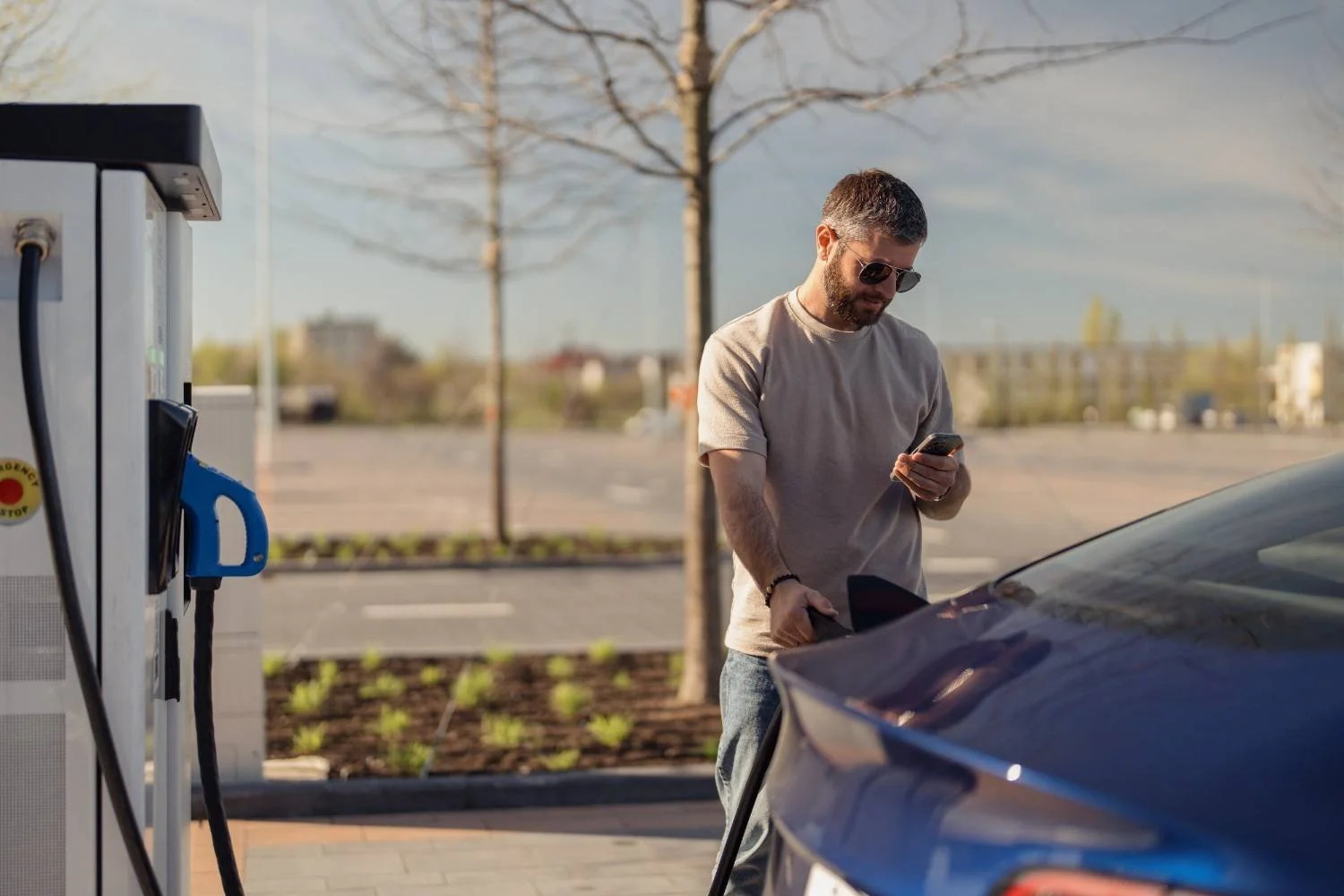What is Salary Sacrifice Charging? The Complete UK Guide for 2025
Source: Shutterstock
There are now over 1.6 million electric cars in the UK, but one of the biggest barriers to electric vehicle (EV) adoption is the rising cost of charging. While EVs offer significant long-term savings, the upfront costs and ongoing charging expenses can feel overwhelming. Enter salary sacrifice charging: a new employee benefit that's changing how we think about EV affordability.
What is Salary Sacrifice Charging?
Salary sacrifice charging is a workplace benefit that can save employees 20-50% on all of their electric car charging costs, whether at home, at work or on public charging networks. This is possible because you pay for charging from your gross salary, before tax and National Insurance deductions. The Charge Scheme is the first and only salary sacrifice solution for EV charging.
In this guide, we’ll explain everything you need to know about salary sacrifice charging in the UK, from how it works to the savings it offers.
Understanding Traditional Salary Sacrifice
You’ve probably heard of salary sacrifice before. It’s an arrangement where employees agree to give up part of their gross salary in exchange for non-cash benefits. This reduces their taxable income, resulting in lower Income Tax and National Insurance contributions. The Cycle-to-Work Scheme is a popular example of this!
Other common salary sacrifice schemes include:
Pension contributions
Childcare vouchers
Company cars
Health insurance
The main advantage lies in the tax savings. When you choose to salary sacrifice a benefit, you pay from your gross salary before tax deductions, rather than from your net salary after tax. The higher your tax rate, the more you can save through salary sacrifice.
EV Charging Salary Sacrifice Explained
Salary sacrifice charging UK schemes work in the same way. Rather than paying for charging from their take-home pay, employees can salary sacrifice these costs, which alleviates the financial burden of owning and running an electric car.
How Does Salary Sacrifice Charging Work?
The process is simple:
Employee setup: Employees receive access to an app and a charge card for paying at public charging stations
Monthly mileage submission: Employees submit their monthly mileage through an easy-to-use portal (which takes as little as 10 seconds)
Cost calculation: The scheme automatically calculates all charging costs, including public, home, and office charging
Payroll adjustment: Employers receive instructions to salary sacrifice the charging costs from the employee's gross salary
This system covers all types of charging:
Home charging: Works with any tariff and any home charger
Public charging: Access to thousands of charging points across the UK
Office charging: Compatible with any workplace charging provider
The Charge Scheme: The World's First Solution
The Charge Scheme is innovative in workplace EV charging schemes. Created by the award-winning team behind The Electric Car Scheme, it's the first-of-its-kind employee benefit specifically designed to make EV charging fairer, easier, and more affordable.
Why The Charge Scheme Was Created
Even with recent price drops of 5-9% bringing the average to 71p/kWh, EV charging is still unaffordable for drivers who can't charge at home. Popular networks like Instavolt typically charge 87p/kWh, which is roughly 22p per mile. Even their discounted September rate of 54p/kWh still costs up to 18p per mile.
The majority of electric car owners will have access to a charger at home or at work, so they won’t have to rely heavily on public charging, but the cost barrier between the two is clear. The Charge Scheme tackles this challenge head-on by:
Making EV charging the cheapest way to power your vehicle
Removing the burden of calculating charging costs
Integrating seamlessly with existing company car schemes
Supporting the transition to Net Zero
Comprehensive Coverage
The Charge Scheme benefits extend to all types of charging:
All Public Charging
Access to over 69,000 public chargers across the UK through the dedicated app
Compatible with major charging networks
No need to carry multiple cards or apps
All Home Charging
Works with any home charging setup
Compatible with all tariffs, including off-peak rates
No restrictions on charger type or installation
All Office Charging
Integrates with any workplace charging provider
Simple plug-in-and-save functionality
Covers paid office charging arrangements
Benefits for Employees and Employers
Employee Benefits
Substantial financial savings: Employees can save £500-£1,000 per year on their personal charging costs. The 20-50% savings apply regardless of charging location or frequency, making electric vehicle ownership significantly more affordable.
Simplified administration: Gone are the days of complex mileage calculations and expense claims. The Charge Scheme calculates the real cost of charging automatically, removing guesswork and administrative burden.
Universal compatibility: The scheme works with any electric vehicle and any company car arrangement, whether employees drive company cars or use existing EV salary sacrifice schemes.
Immediate setup: The app and charge card can be set up in minutes, with no complex onboarding or lengthy approval processes.
Employer Benefits
Zero-cost implementation: The Charge Scheme bolts directly onto existing company car schemes with no additional cost or administrative burden for employers. It's a true zero-cost addition to employee benefits packages.
Enhanced scheme uptake: By addressing one of the main barriers to EV adoption, employers see increased participation in their electric vehicle schemes. This supercharges existing company car programmes.
Net zero acceleration: Offering salary sacrifice charging increases the incentive for employees to choose electric vehicles, directly supporting corporate sustainability goals and Net Zero commitments.
Competitive advantage: Forward-thinking employers can differentiate themselves in the talent market by offering benefits that address real employee concerns about EV ownership costs.
Implementation Process
Implementing workplace EV charging schemes through The Charge Scheme is straightforward, whether you have an existing company car scheme or not.
For Companies with Existing Car Schemes
The integration process for companies is straightforward:
Initial setup: The Charge Scheme team works with your existing scheme provider to integrate the charging benefit
Employee communication: Clear guidance and materials help communicate the new benefit to employees
App distribution: Employees will get access to The Charge Scheme app and a physical charge card
Payroll integration: Simple monthly instructions enable payroll teams to process salary sacrifice adjustments
Ongoing support: Continuous support means everything can run smoothly, and employees can get the most out of the scheme!
For Companies Without Car Schemes
If you don’t already have a salary sacrifice car scheme in place, we can help you get set up with The Electric Car Scheme, which offers:
Complete EV salary sacrifice car programmes
Integration with The Charge Scheme from day one
Full support
Employee education and onboarding
Tax Implications and Savings
To maximise your salary sacrifice charging benefits, you need to understand the tax implications. The scheme operates within HMRC guidelines for salary sacrifice arrangements, but several other tax considerations make EVs particularly attractive.
Salary sacrifice gives employees the opportunity to save on both Income Tax and National Insurance contributions on the sacrificed amount. The current UK tax rates for 2025/26 are as follows:
Basic rate: 20% Income Tax
Higher rate: 40% Income Tax
Additional rate: 45% Income Tax
How Tax Savings Work
When employees' salary sacrifice EV charging costs, they will see:
Gross salary reduction: The monthly charging cost is deducted from gross salary before tax calculations
Reduced taxable income: Lower taxable income results in reduced Income Tax and National Insurance contributions
Net savings: The tax savings significantly offset the charging costs
Benefit-in-Kind (BiK) Tax for Electric Cars
If you're considering an electric company car alongside charging benefits, Benefit-in-Kind tax is highly relevant. BiK is a tax on employees who receive benefits like company cars on top of their salary, with their employer deducting the tax through PAYE.
Key points about BiK and electric cars include:
HM Treasury sets BiK tax rates, which are deducted from your salary through PAYE
Choosing a zero-emissions electric vehicle over petrol or diesel can lead to significant savings
Current BiK rates make electric cars particularly attractive, with company car tax on EVs considerably lower than conventional vehicles
BiK tax for EVs is currently 3%, which is far below petrol and diesel rates of up to 37%
Vehicle Excise Duty (VED) Changes
Electric vehicle road tax changed in April 2025, ending the previous zero-rate exemption:
Current EV rates: New electric cars now pay £10 in year one and £195 annually thereafter
Pre-2017 EVs: Electric cars registered before 2017 continue to pay just £20 per year
Luxury EV supplement: Electric cars over £40,000 (based on original list price) pay an additional £425 annually for five years
While EVs now pay road tax, they remain significantly more tax-efficient than petrol and diesel alternatives, making salary sacrifice charging an even more valuable benefit for managing overall EV running costs.
How Europa Worldwide Group Is Saving Staff Thousands on EV Charging
Europa Worldwide implemented the Charge Scheme earlier this year. As one of the largest transport and logistics companies in the United Kingdom, they needed a solution that worked for team members constantly on the move, which is why they chose to implement The Charge Scheme.
"For a logistics company like ours, with team members on the move across various sites, the ability for our staff to save 20-50% on all charging costs through salary sacrifice has been transformative in encouraging the switch to electric vehicles," explains Amy.
The comprehensive nature of The Charge Scheme was for their operational needs, covering charging at home, company sites, and public networks. The seamless integration with existing payroll processes created minimal administrative burden, while several team members have reported annual savings exceeding £600!
Your Guide to Getting Started
Ready to explore salary sacrifice charging for your business? Here's a step-by-step guide on how to get started.
Step 1: Assessment
For Companies with Existing Schemes:
Review your current company car or EV scheme
Understand employee interest in charging benefits
For Companies Without Schemes:
Consider adding an EV salary sacrifice scheme to your employee benefit package
Assess employee demand for sustainable transport options
Step 2: Book a Call With One of Our Friendly Team!
The Charge Scheme offers two options to get started. You can either:
Book a demo to see how the system works
Book a call to discuss your specific requirements
Step 3: Add The Charge Scheme to Your Current Setup
For Companies with Existing Car Schemes: The Charge Scheme bolts directly onto your existing company car scheme, with no additional cost or administrative burden.
For Companies Without Car Schemes: Get started with The Electric Car Scheme, which integrates with The Charge Scheme from the beginning.
Step 4: Implementation
Once set up, the process follows four simple steps:
Employees set up the app and charge card in minutes
Employees submit monthly mileage through the portal
The Charge Scheme calculates all charging costs
Employers adjust payroll based on the instructions provided
The Charge Scheme team will give your team and employees the support they need throughout the process to make sure it is as smooth as possible!
The Future of EV Charging Affordability
Salary sacrifice charging represents a shift in how we approach EV affordability. By addressing one of the primary barriers to electric vehicle adoption (charging costs), schemes like The Charge Scheme are accelerating the transition to sustainable transport.
The UK government's commitment to phasing out petrol and diesel cars by 2030 makes solutions like salary sacrifice charging increasingly important. Supporting EV adoption needs comprehensive approaches that address the vehicle costs and ongoing running expenses, which is why there are government grants for low-emission vehicles!
Industry Impact
The introduction of electric car charging salary sacrifice is already showing an impact:
Increased EV adoption: Removing cost barriers encourages more employees to choose electric vehicles
Enhanced scheme value: Existing company car schemes become more attractive with integrated charging benefits
Corporate sustainability: Companies can accelerate Net Zero progress through employee incentives
Market development: Growing demand supports charging infrastructure expansion
Salary sacrifice charging makes electric cars more accessible and affordable for employees - it gives them the opportunity to save 20-50% on their EV charging while employers gain a powerful tool for supporting sustainability goals without an additional expense. This is a win-win!
Whether you’re considering your first EV or looking to reduce your current running costs, salary sacrifice charging is a great way to save extra cash.
Ready to explore how salary sacrifice charging could benefit your business? Get in touch with The Charge Scheme team to learn more about this great employee benefit, joining the companies already help their teams save thousands on EV charging costs.
You Might Also Like…
Last updated: 04/09/2025
Our pricing is based on data collected from The Charge Scheme Calculator. All final pricing is inclusive of VAT. All deals are subject to credit approval and availability. All deals are subject to excess mileage and damage charges. Prices are calculated based on the following tax saving assumptions; England & Wales, 40% tax rate. The Charge Scheme is a product of The Electric Car Scheme™ – a trusted, trademarked brand dedicated to making electric driving more affordable. All rights reserved. The Electric Car Scheme is the trading style of The Electric Car Scheme Limited (company number 12646157, ICO number ZB030706, VAT number 439430195) and The Electric Car Scheme Holdings Limited (company number 13295877, ICO number ZB252629). Head office & registered address: The Shipping Building, 254 Blyth Road, Hayes, UB3 1HA. The Electric Car Scheme Limited provides services for the administration of salary sacrifice employee benefits. The Electric Car Scheme Holdings Limited is a member of the BVRLA (10608) is authorised and regulated by the FCA under FRN 968270, is an Appointed Representative of Marshall Management Services Ltd under FRN 667174, and is a credit broker and not a lender.
Copyright and Image Usage: All images used on this website are either licensed for commercial use or used with express permission from the copyright holders, in compliance with UK and EU copyright law. We are committed to respecting intellectual property rights and maintaining full compliance with applicable regulations. If you have any questions or concerns regarding image usage or copyright matters, please contact us at marketing@electriccarscheme.com and we will address them promptly.





